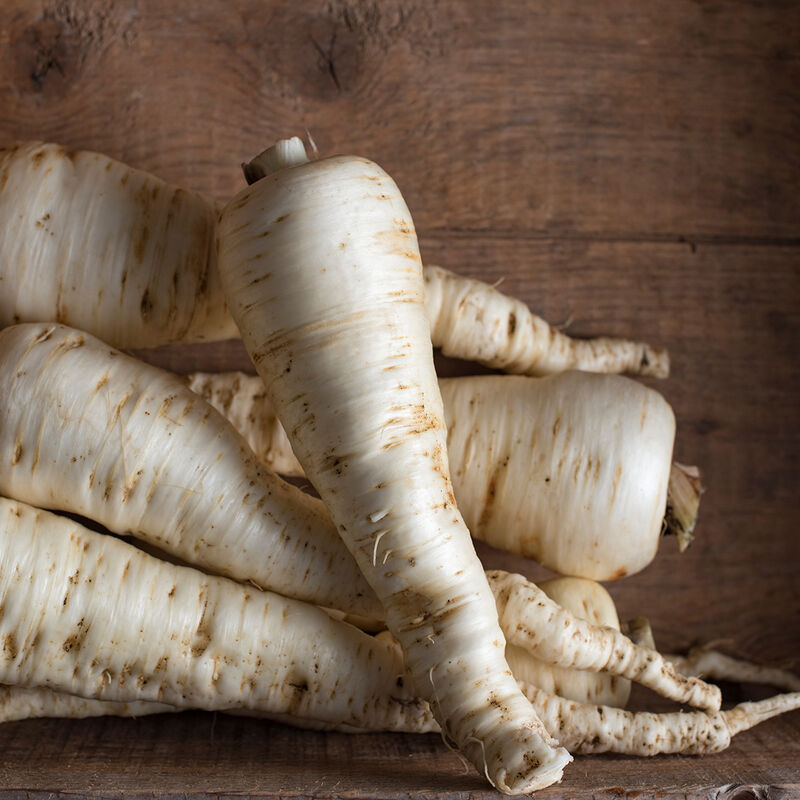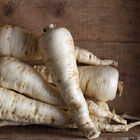Albion Pelleted (F1) Parsnip Seed
Product ID:2522JP.112522JP
Albion Pelleted (F1) Parsnip Seed
Product ID:2522JP.112522JP
For fall harvests. Conventional seed with NOP-compliant pelleting.
Long, tapered roots are noticeably whiter and slower to discolor than Javelin. Large roots are suitable for fresh market or processing.Specs:
- This product does not ship to the following countries: United Arab Emirates, Austria, Australia, Barbados, Belgium, Bulgaria, Bermuda, Bahamas, Switzerland, Cyprus, Czech Republic, Germany, Denmark, Estonia, Spain, Finland, France, United Kingdom, Greece, Hong Kong, Croatia, Hungary, Ireland, Iceland, Italy, Japan, Republic of Korea, Kuwait, Cayman Islands, Lithuania, Luxembourg, Latvia, Malta, Netherlands, Norway, New Zealand, Oman, Poland, Portugal, Qatar, Romania, Saudi Arabia, Sweden, Singapore, Slovenia, Slovakia, San Marino, Thailand, Trinidad and Tobago, Taiwan, Ukraine.
SCIENTIFIC NAME:
Pastinaca sativaCULTURE:
Parsnips require well-drained soils, with a pH range of 6.0–6.8. Deep, loose, and fertile sandy loams and peat soils with good moisture-holding capacity grow the straightest and smoothest roots. Pelleted seed requires a little extra attention when it comes to watering, as it performs best with consistent, moderate soil moisture throughout the germination period. An initial watering will split or dissolve the pellet, but if the soil is allowed to dry out before the germination period is over, the seed may receive insufficient moisture for optimal germination.PLANTING:
Sow in early to midspring in a 2" band about 2-3" apart (20 seeds/ft.), ½" deep, in rows 18–24" apart. Seed normally requires 3 weeks to germinate. Do not allow soil to dry out prior to emergence.HARVEST:
Mow tops and fork or undermine, or use root crop harvester. Parsnips require a full season of growth, and their sweet flavor is brought on by cold weather. Dig in the fall or leave in the ground through the winter. When harvesting in early spring, dig before the tops begin to re-grow for the highest quality roots.STORAGE:
Hold washed or unwashed in perforated bags or bins at 32°F (0°C) and 95% relative humidity.PELLET STORAGE:
Pelleting offers many advantages, but the pelleting process also shortens the shelf life of the seed. We recommend using pelleted seed within one year of purchase. If you need to store pelleted seeds until planting, protect them from heat and humidity in a cool, dark, dry place. If you prefer to store your seed in the refrigerator, be sure to place the seed in an air-tight container to protect it from fluctuations in humidity.AVG. SEEDING RATE:
130,680 pellets/acre @ 6 pellets/ft. (2" spacing) in rows 24" apart or 6,000 pellets/1,000 ft. row.PELLET SIZE:
18.0.SEED SPECS:
PELLETS/LB.: 5,400–6,100 (avg. 5,700).PACKET:
250 pellets sows 41'.CAUTION:
In rare instances, contact with the foliage can result in a severe rash. When working with this crop on hot, sunny days, we recommend wearing long sleeves and long pants and washing any exposed skin surfaces as soon as possible after contact.Johnny's is committed to your success, every step of the way.
We want you, our customer, to be 100% satisfied with all of our seeds, tools, and supplies.
If anything you purchase from us proves unsatisfactory, we will either replace the item or refund the purchase price.





